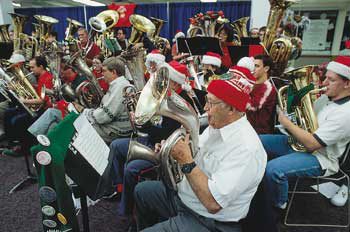By Allen W. Palmer
Browsing through a shop in Jackson Hole, Wyo., one summer day in the early 1980s, I overheard a conversation that drew my attention. Two people were discussing the imminent college plans of one of their sons, and the parent was explaining to his acquaintance why his child was going to enroll at Ricks College that year.
The discussion revolved around recollections of when this parent himself attended Ricks College almost 20 years earlier. He had encountered an almost legendary Ricks science teacher who not only taught lessons of science in the classroom, he also taught lessons of life to the students he encountered. “Any college that has teachers like him is the place I want my children to go.”
While serving as a Ricks teacher for almost 10 years before joining the BYU faculty, and watching two of my own children graduate there, I closely watched the science teacher I learned about that day in Jackson Hole. I could see him from my office window in the Spori Building walking to a nearby ice-cream shop, almost every day with a different student in tow. I never heard the conversations, but I know there was a lot of counseling undertaken over ice cream by that man.
Over the years I have rarely encountered anyone who doesn’t speak with deep fondness for what they found at Ricks. There were ample reasons for many young Latter-day Saints and others to travel each fall to the wind-swept plains of the Snake River Valley in eastern Idaho. Even those who went reluctantly, perhaps prodded by friends, parents, or Church leaders, often found the place to be friendly and reassuring, a place where both intellect and spirit could grow and mature for a season before launching ahead to universities or employment, families and futures.
Just as at BYU, people frequently referred to the “Spirit of Ricks.” Yes, it was a small Idaho town, where stories about the wind and cold were legends shared among everyone who lived through the winters. But it was also the place where thousands rubbed shoulders with a group of remarkably dedicated teachers and administrators.
Yet for three or four decades, a persistent, nagging question echoed in the hallways, classrooms, and offices of Ricks College: Will this two-year college ever offer a four-year program? The answer, official and unofficial, was always the same emphatic but gentle no. But as an example of the adaptability of life in the councils and quorums of the LDSChurch, the answer changed abruptly in late June 2000—and it caught almost everyone who ever asked the question off guard.
The announcement that Ricks College would change its name to Brigham Young University—Idaho, and drop its intercollegiate sports program, stunned almost everyone in Rexburg and Provo who has been associated with the Church educational programs.
What the change means in terms of curricula, enrollments, and faculty, is still to be worked out. The only specifications given by LDS Church President Gordon B. Hinckley in his announcement was that it was time to begin discussions about extending the curriculum to four-year degrees, to make a name change at the college, and to phase out the intercollegiate sports program because of its expense. As part of the announcement, it was affirmed that the college would not adopt a formal academic ranking system.
Elder Henry B. Eyring of the Quorum of the Twelve, the commissioner of Church education and a former president of Ricks College, emphasized that the student focus that has long been the hallmark of the school would remain. And BYU President Merrill J. Bateman explained that the changes would ease the enrollment pressure at BYU in Provo, where proportionately fewer LDS students can enroll as Church membership expands throughout the world.
Ricks College President David Bednar, and other college administrators, have been deluged with questions about the changes but have affirmed they don’t yet know all the answers. The college has notified its accrediting agencies that it intends to expand its curricular offering, and it has assured other interested parties that it will honor its commitments to scholarshipped athletes and sports schedules but that the sports programs would be scaled back. Administrators have indicated that the name change will not take place until accreditation issues are resolved.
Beyond these, however, there are few answers to the new questions that now impose themselves. Ricks College has carved its niche for thousands of former students and teachers. What the college meant in the minds and hearts of those who knew it over these past decades can barely be defined in empirical terms. In many ways, Ricks was more than the sum of its parts.
What the new programs will mean to the school, its faculty and students, remains to be seen. It is likely, however, that whatever results will not deviate far from what made the place so worthwhile and good in the past.









